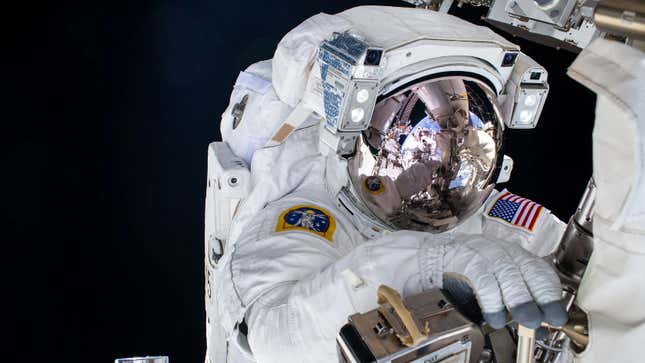
Yesterday, a NASA livestream falsely indicated that an ISS astronaut was experiencing decompression sickness (DCS), a potentially life-threatening condition, ahead of a scheduled spacewalk.
NASA broadcast an emergency situation on board the ISS on Wednesday at 6:32 p.m., with a voice from ground control asking to put an unnamed “commander” in his spacesuit for hypobaric treatment after being exposed to increased pressure.
Hundreds of people were tuning in to the livestream, and the audio led them to believe that an astronaut was in critical condition. “The hypobaric exposure is the big problem and given his exam, I am concerned that there are some severe DCS hits,” the voice in the audio said. “I would recommend trying to get him in his suit as soon as possible and giving oxygen as best as able during that process.”
About an hour later, the space agency clarified that there was no emergency situation on the ISS; instead the aired audio was from a simulation channel on the ground “indicating a crew member was experiencing effects related to decompression sickness,” NASA wrote on X.
“This audio was inadvertently misrouted from an ongoing simulation where crew members and ground teams train for various scenarios in space and is not related to a real emergency,” NASA added. “The International Space Station crew members were in their sleep period at the time. All remain healthy and safe.”
Decompression sickness, also known as the bends, typically occurs with change in pressure during scuba diving and can sometimes affect astronauts during spacewalks, forming bubbles in the bloodstream.
NASA had scheduled a spacewalk on Thursday for astronauts Tracy Dyson and Matt Dominick to complete the removal of a faulty electronics box. About an hour before the crew was anticipated to exit the ISS airlock, NASA announced that the spacewalk had been postponed due to a spacesuit discomfort issue. It’s likely that the two incidents are not related, but a rather unfortunate coincidence.
For more spaceflight in your life, follow us on X and bookmark Gizmodo’s dedicated Spaceflight page.






















+ There are no comments
Add yours